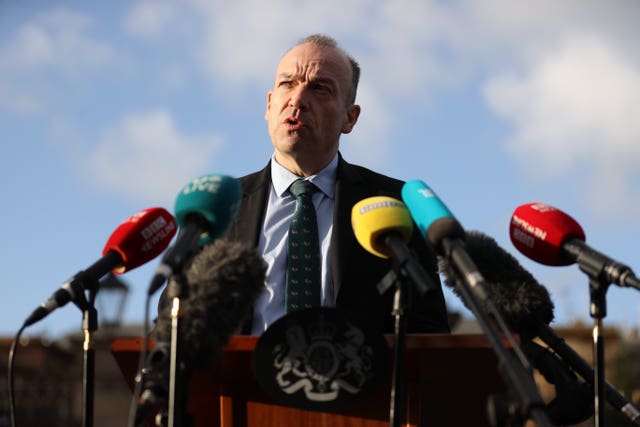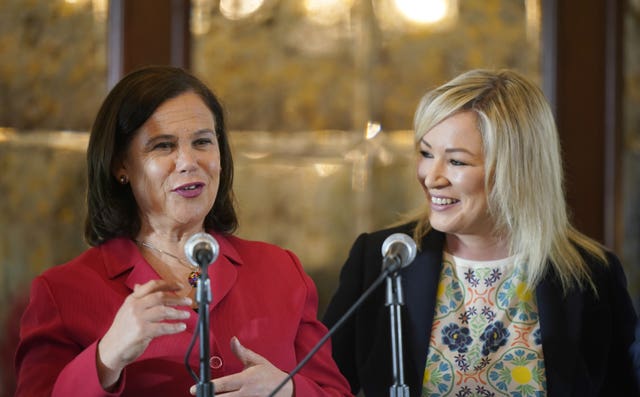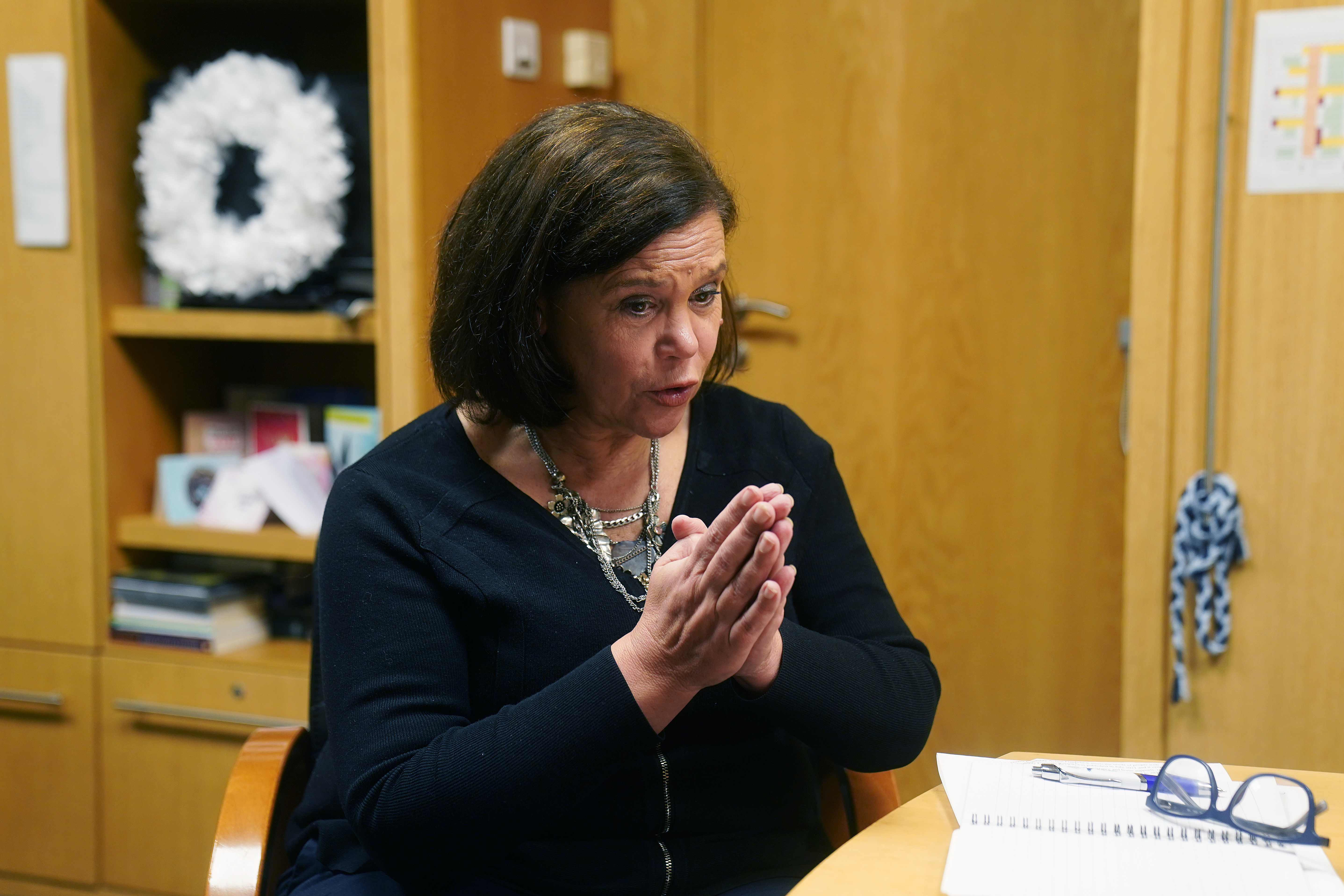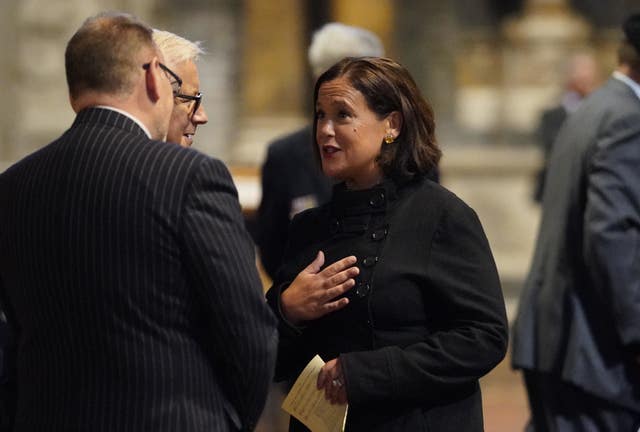An Irish government led by Sinn Fein would deliver a “step change” in preparing for unification, with a border poll a possibility within the lifetime of the next Dail, party leader Mary Lou McDonald has said.
Ms McDonald said if Sinn Fein secures power following the next general election in Ireland it would use its mandate to press the UK government to clearly spell out the criteria for determining the threshold for triggering a vote on constitutional change in Northern Ireland.
One option Sinn Fein would consider if in government in Dublin would be the creation of a minister of state role with responsibility for driving unity preparations, Ms McDonald added.
Her party has long been calling for the current Irish government to establish some form of civic platform, such as a citizens’ assembly, to examine what a unified island of Ireland might look like in terms of how public services would operate or how different traditions and cultures would be incorporated.
In a wide-ranging interview with the PA news agency, the Sinn Fein president also signalled that, as taoiseach, she would have no issue attending commemorative events associated with the unionist tradition in Northern Ireland, such as Remembrance Sunday.
Ms McDonald said the current Fine Gael, Fianna Fail and Green Party coalition in Dublin should have already created a “democratic space” to begin conversations and preparations for “constitutional transition”.
“And certainly Sinn Fein in government would very proactively promote not just that conversation, but real preparations north and south – a real conversation between and across systems around how we maximise the huge opportunity that presents us,” she said.
The Dublin Central TD added: “There has to be a step-change in that regard, as regards a new Ireland, constructing a new Ireland and creating the drivers for that.”
“One thing for sure is, it will only happen if you have a government that’s actually serious about the proposition and actually fully understands what it can mean for Ireland, and who is ambitious to create that space and those opportunities for our people.”
Asked if the creation of a junior ministry for unification was a possibility under a Sinn Fein-led government, Ms McDonald added “we will consider any and all of those approaches”.
Under the terms of the 1998 Good Friday Agreement, the Northern Ireland Secretary of the day is obliged to call a border poll if evidence points to a shift in public mood in favour of constitutional change.

“It’s a question that has been put to successive British prime ministers and they have thus far refused to set out in their view what’s the test, what’s the tipping point,” said Ms McDonald.
“I think people deserve clarity on that point. And I would very much hope that a new British government and incoming British government would be more transparent on that question than has been the case so far.”
Ms McDonald said a new Irish government proactively advocating unity would not necessarily lead to a cooling of relations with Downing Street.
“That depends on who you talk to,” she said.

“I think that you can multi-task politically.
“So, I think and believe that it’s absolutely possible to work powersharing (in Northern Ireland) and at the same time prepare for the future.
“As a matter of fact, I don’t just believe that we can do it, we have to do that. I think that’s entirely possible.
“And the Good Friday Agreement is 25 years old this year, 26 years in the year coming. And it has always been explicitly understood and wired into that agreement that the constitutional question is a live one, that it is a matter that will be decided democratically by the people without impediment or coercion or interference. So, we’re simply sticking to the spirit and letter of the agreement.
“And, actually, I think when this conversation and process gets under way, I think people are going to find that it is extremely productive. I think we’re going to surprise some, we’re going to surprise ourselves as to the kind of opportunities that we can create for each other working together.”

However, at that point, it would almost certainly still need to find smaller coalition partners to secure enough seats for a Dail majority.
Ms McDonald rejected the suggestion that such a front-foot approach to unification may create difficulties when trying to find partners willing to sign up to an agreed programme for government.
“When you look at any of the political parties, each of them, at least rhetorically, say that they are for reunification,” she said.
“There is a timing issue (Fianna Fail and Fine Gael do not believe it is the right time for a border poll) but I mean if in principle you agree (on Irish unity), and everybody who is a signatory to the Good Friday Agreement has accepted that the issue of partition is a matter that is democratically adjudicated by the people – that’s not controversial, that the method for a decision is referendum – so, yes, it’s about a question of timing, but it’s also a question of being prepared.
“I’m very clear in my own mind that it is only reasonable and fair for people to ask ‘well, in a united Ireland, do I have to go and pay to see my general practitioner?’ I think that’s a fair question. I think it’s fair and I think it’s only reasonable that we have answers to a number of those kind of core issues.”
Ms McDonald also reflected on how she would approach the role of taoiseach if she became Irish premier.
Asked if she would be prepared to go to Remembrance Sunday ceremonies in Northern Ireland, like Irish government ministers have in recent years, she said: “Well as a matter of fact, I go to Remembrance Sunday in St Patrick’s Cathedral (in Dublin). But, yeah, I mean, that’s a good example.
“I think it’s absolutely appropriate that that is a moment in which the taoiseach, on behalf of all Irish people, irrespective of your tradition, that we stand in remembrance and respect for that tradition.
“And there are others: I mean, you could cite other examples, but, yes, of course, that’s the job, that’s what’s required.”

“I actually think that that is not going to be a source of contention, for the simple reason that I will do everything within my power to be balanced and respectful,” she said.
“I am an Irish republican and I’m the leader of Sinn Fein. People know my political views.
“Any leader, you have to be authentically yourself, that’s who I am, but I am also very, very clear in my mind around the additional expectations that people have of you when you occupy the highest office in the land.
“So, I can assure you that I’m very, very conscious of that. And the objective of any Taoiseach worthy of the name has to be – in a balanced, respectful and fair way and being authentically yourself – to give expression and to give respect to all traditions across society.
“So, actually, to be honest with you, it’s a challenge that I would relish.”






